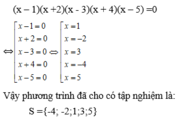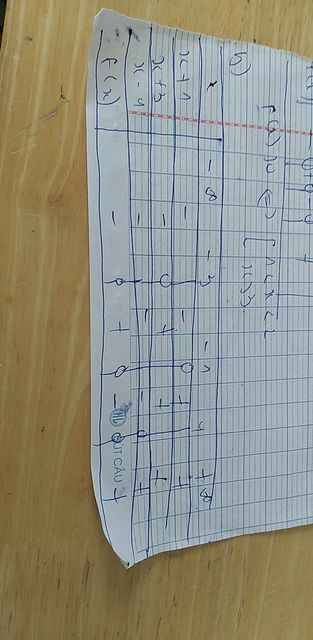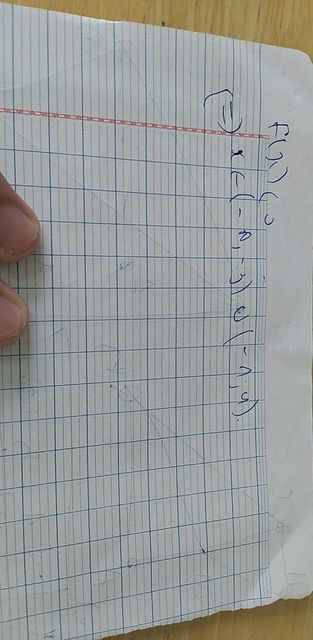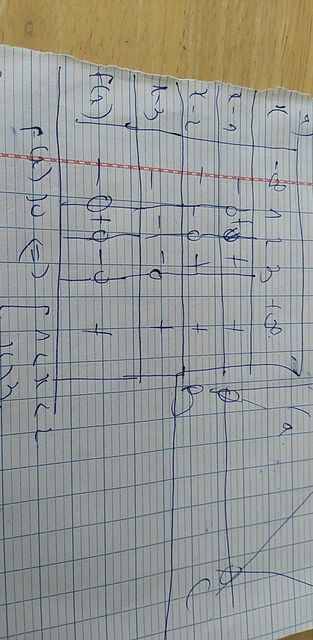Giải các phương trình sau: x 4 + x 3 + x + 1 = 0
Hãy nhập câu hỏi của bạn vào đây, nếu là tài khoản VIP, bạn sẽ được ưu tiên trả lời.



Mình khuyên bạn thế này :
Bạn nên tách những câu hỏi ra
Như vậy các bạn sẽ dễ giúp
Và cũng có nhiều bạn giúp hơn !
Bài 1.
a) ( x - 3 )( x + 7 ) = 0
<=> x - 3 = 0 hoặc x + 7 = 0
<=> x = 3 hoặc x = -7
Vậy S = { 3 ; -7 }
b) ( x - 2 )2 + ( x - 2 )( x - 3 ) = 0
<=> ( x - 2 )( x - 2 + x - 3 ) = 0
<=> ( x - 2 )( 2x - 5 ) = 0
<=> x - 2 = 0 hoặc 2x - 5 = 0
<=> x = 2 hoặc x = 5/2
Vậy S = { 2 ; 5/2 }
c) x2 - 5x + 6 = 0
<=> x2 - 2x - 3x + 6 = 0
<=> x( x - 2 ) - 3( x - 2 ) = 0
<=> ( x - 2 )( x - 3 ) = 0
<=> x - 2 = 0 hoặc x - 3 = 0
<=> x = 2 hoặc x = 3

\(a,\dfrac{x-3}{x}=\dfrac{x-3}{x+3}\)\(\left(đk:x\ne0,-3\right)\)
\(\Leftrightarrow\dfrac{x-3}{x}-\dfrac{x-3}{x+3}=0\)
\(\Leftrightarrow\dfrac{\left(x-3\right)\left(x+3\right)-x\left(x-3\right)}{x\left(x+3\right)}=0\)
\(\Leftrightarrow x^2-9-x^2+3x=0\)
\(\Leftrightarrow3x-9=0\)
\(\Leftrightarrow3x=9\)
\(\Leftrightarrow x=3\left(n\right)\)
Vậy \(S=\left\{3\right\}\)
\(b,\dfrac{4x-3}{4}>\dfrac{3x-5}{3}-\dfrac{2x-7}{12}\)
\(\Leftrightarrow\dfrac{4x-3}{4}-\dfrac{3x-5}{3}+\dfrac{2x-7}{12}>0\)
\(\Leftrightarrow\dfrac{3\left(4x-3\right)-4\left(3x-5\right)+2x-7}{12}>0\)
\(\Leftrightarrow12x-9-12x+20+2x-7>0\)
\(\Leftrightarrow2x+4>0\)
\(\Leftrightarrow2x>-4\)
\(\Leftrightarrow x>-2\)

a: \(\Leftrightarrow\left(4x+14\right)^2-\left(3x+9\right)^2=0\)
=>(4x+14+3x+9)(4x+14-3x-9)=0
=>(7x+23)(x+5)=0
=>x=-23/7 hoặc x=-5
\(a,\\ \Leftrightarrow7x^2+58x+115=0\\ \Leftrightarrow\left(x+5\right)\left(7x+23\right)=0\\ \Leftrightarrow\left\{{}\begin{matrix}x+5=0\\7x+23=0\end{matrix}\right.\Leftrightarrow\left\{{}\begin{matrix}x=-5\\x=-\dfrac{23}{7}\end{matrix}\right.\)
\(b,\\ \Leftrightarrow\left[\left(x+1\right)\left(x+5\right)\right]\left[\left(x+3\right)\left(x+4\right)\right]=0\\ \Leftrightarrow\left(x^2+6x+5\right)\left(x^2+6x+8\right)=0\\ \LeftrightarrowĐặt.x^2+6x+5=a\\ \Leftrightarrow a=a\left(a+3\right)=10\\ \Leftrightarrow a^2+3a-10=0\\ \Leftrightarrow\left(a+5\right)\left(a-2\right)=0\\ \Leftrightarrow\left[{}\begin{matrix}a=-5\\a=2\end{matrix}\right.\Rightarrow\left[{}\begin{matrix}x^2+6x+5=-5\\x^2+6x+5=2\end{matrix}\right.\\ \Leftrightarrow\left[{}\begin{matrix}x^2+6x+10=0\\x^2+6x+3=0\end{matrix}\right.\\ \left(Vô.n_o\Delta=36-40=-4< 0\right)\)
\(\Leftrightarrow\left[{}\begin{matrix}x=-3+\sqrt{6}\\x=-3-\sqrt{6}\end{matrix}\right.\)

`a,(2x-5)(12+5x)=0`
\(\Leftrightarrow\left[{}\begin{matrix}2x-5=0\\12+5x=0\end{matrix}\right.\Leftrightarrow\left[{}\begin{matrix}2x=5\\5x=-12\end{matrix}\right.\Leftrightarrow\left[{}\begin{matrix}x=\dfrac{5}{2}\\x=-\dfrac{12}{5}\end{matrix}\right.\)
`b, (x-3)(x-4)-2(x-3)=0`
`<=>(x-3)(x-4-2)=0`
`<=>(x-3)(x-6)=0`
\(\Leftrightarrow\left[{}\begin{matrix}x-3=0\\x-6=0\end{matrix}\right.\Leftrightarrow\left[{}\begin{matrix}x=3\\x=6\end{matrix}\right.\)
`c, x(x-1)(x+1)=0`
\(\Leftrightarrow\left[{}\begin{matrix}x=0\\x-1=0\\x+1=0\end{matrix}\right.\Leftrightarrow\left[{}\begin{matrix}x=0\\x=1\\x=-1\end{matrix}\right.\)
`d, (2x)/3 +(2x-1)/6=0`
`<=> (4x)/6 +(2x-1)/6=0`
`<=> (4x+2x-1)/6=0`
`<=> (6x-1)/6=0`
`<=> 6x-1=0`
`<=> 6x=1`
`<=>x=1/6` ( đề là vậy à bạn )
a) \(\left(2x-5\right)\left(12+5x\right)=0\)
\(\Leftrightarrow\left[{}\begin{matrix}2x-5=0\\12+5x=0\end{matrix}\right.\Leftrightarrow\left[{}\begin{matrix}2x=5\\5x=-12\end{matrix}\right.\Leftrightarrow\left[{}\begin{matrix}x=2,5\\x=-2,4\end{matrix}\right.\)
b) \(\left(x-3\right)\left(x-4\right)-2\left(x-3\right)=0\)
\(\Leftrightarrow\left(x-3\right)\left[\left(x-4\right)-2\right]=0\)
\(\Leftrightarrow\left(x-3\right)\left(x-6\right)\)
\(\Leftrightarrow\left[{}\begin{matrix}x-3=0\\x-6=0\end{matrix}\right.\Leftrightarrow\left[{}\begin{matrix}x=3\\x=6\end{matrix}\right.\)
c) \(x\left(x-1\right)\left(x+1\right)=0\)
\(\Leftrightarrow\left[{}\begin{matrix}x+1=0\\x-1=0\\x=0\end{matrix}\right.\Leftrightarrow\left[{}\begin{matrix}x=-1\\x=1\\x=0\end{matrix}\right.\)
d) \(\dfrac{2x}{3}+\dfrac{2x-1}{6}=0\)
\(\Leftrightarrow\dfrac{4x+2x-1}{6}=0\)
\(\Leftrightarrow6x-1=0\)
\(\Leftrightarrow6x=1\Leftrightarrow x=\dfrac{1}{6}\)

a) (2x-1)(3-2x)=0
\(\Leftrightarrow\orbr{\begin{cases}2x-1=0\\3-2x=0\end{cases}\Leftrightarrow\orbr{\begin{cases}2x=1\\2x=3\end{cases}\Leftrightarrow}\orbr{\begin{cases}x=\frac{1}{2}\\x=\frac{3}{2}\end{cases}}}\)
b) x(x-1)\(\left(x+\frac{3}{4}\right)\)=0
<=> x=0 hoặc x-1=0 hoặc \(x+\frac{3}{4}=0\)
<=> x=0 hoặc x=1 hoặc \(x=\frac{-3}{4}\)
Vậy \(x=\left\{0;1;\frac{-3}{4}\right\}\)
a,\(\left(2x-1\right).\left(3-2x\right)=0\)
\(< =>\orbr{\begin{cases}2x-1=0\\3-2x=0\end{cases}}\)
\(< =>\orbr{\begin{cases}2x=1\\3=2x\end{cases}< =>\orbr{\begin{cases}x=\frac{1}{2}\\x=\frac{2}{3}\end{cases}}}\)

Bạn cần viết đề bằng công thức toán (biểu tượng $\sum$ góc trái khung soạn thảo) đẻ được hỗ trợ tốt hơn. Viết như thế kia rất khó đọc => khả năng bị bỏ qua bài cao.
a: =>3x=3
=>x=1
b: =>12x-2(5x-1)=3(8-3x)
=>12x-10x+2=24-9x
=>2x+2=24-9x
=>11x=22
=>x=2
c: =>2x-3(2x+1)=x-6x
=>-5x=2x-6x-3=-4x-3
=>-x=-3
=>x=3
d: =>2x-5=0 hoặc x+3=0
=>x=5/2 hoặc x=-3
e: =>x+2=0
=>x=-2

Bài 1:
a: Ta có: 4x+20=0
nên 4x=-20
hay x=-5
b: Ta có: \(\left(x^2-2x+1\right)-4=0\)
\(\Leftrightarrow\left(x-1\right)^2=4\)
\(\Leftrightarrow\left[{}\begin{matrix}x-1=2\\x-1=-2\end{matrix}\right.\Leftrightarrow\left[{}\begin{matrix}x=3\\x=-1\end{matrix}\right.\)
c: Ta có: \(\dfrac{x+3}{x+1}+\dfrac{x-2}{x}=2\)
\(\Leftrightarrow\dfrac{x\left(x+3\right)}{x\left(x+1\right)}+\dfrac{\left(x+1\right)\left(x-2\right)}{x\left(x+1\right)}=\dfrac{2x\left(x+1\right)}{x\left(x+1\right)}\)
Suy ra: \(x^2+3x+x^2-2x+x-2=2x^2+2x\)
\(\Leftrightarrow4x-2-2x=0\)
\(\Leftrightarrow2x=2\)
hay \(x=1\left(nhận\right)\)
Bài 2:
Ta có: \(3x-\left(7x+2\right)>5x+4\)
\(\Leftrightarrow3x-7x-2-5x-4>0\)
\(\Leftrightarrow-9x>6\)
hay \(x< -\dfrac{2}{3}\)




